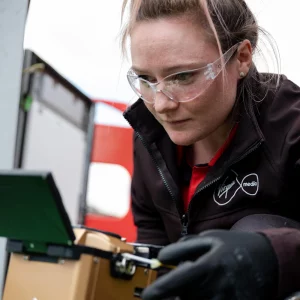Sponsored Links
CMA Seeks Change in Government Attitude Towards Universal UK Broadband
Posted: 13th Feb, 2010 By: MarkJ
 The CMA (part of BCS), the UK's premier membership organisation for ICT professionals, has today claimed that neither of the universal rural broadband strategies put forward by the Conservative and Labour Parties will achieve their goals "quickly or comprehensively" enough.
The CMA (part of BCS), the UK's premier membership organisation for ICT professionals, has today claimed that neither of the universal rural broadband strategies put forward by the Conservative and Labour Parties will achieve their goals "quickly or comprehensively" enough.This week it emerged that the owners of a bed and breakfast business in Cumbria were given the chance to upgrade their Internet service to broadband at a cost of £45,000 because the process would have meant installing new equipment for their village—which was already at capacity for broadband users (here).
The CMA sights this as an example of why things need to change, calling it a, "vivid illustration of the poverty of thought and action that is serving UK businesses so badly." It is therefore calling for two allegedly distinct, but related actions:
* A clear commitment from all main political parties to implementing universal access to affordable, high-speed, symmetrical [same speed of service for both upload and downloads] broadband before 2017.The Conservative Party recently pledged to get 100Mbps broadband into the "majority" of the UK’s homes by 2017, and proposes using part of the BBC’s Licence fee (3.5%) to help fund this. By contrast the Labour Party has already announced its intention for a 50p +vat a month tax on every fixed landline to pay for the roll-out of next generation broadband to 90% of the country by 2017. Both will focus on rural areas.
* Positive encouragement of local authorities and businesses to invest in online services and social infrastructure, to take advantage of universal access to broadband. This could be achieved, for example, by favouring business plans that specify web-based services. Such plans would be supported through positive action by both Regulator and Government, and would allow return on investment to be tracked.
In addition Labour has also set aside approximately £200m to help make broadband download speeds of 2Mbps available to everybody in the country by 2012 (Universal Service Commitment). However there is no clear commitment to making sure that the chosen technologies would offer a reliable, affordable, flexible or even low latency connection.
Carolyn Kimber, CMA Chairman, says:
"Talking about £150-200m of investment a year rolling out broadband to the unserved areas is not going to create the flourishing online economy which we at CMA know is the economic future of the UK.
Lots of councils and most Government services are already going down the online route - for example via the G-cloud - and there are benefits in terms of improving services that people can expect, and it can also help to cut costs. For businesses, trading online means attracting customers from anywhere in the world, leading to massive opportunities for UK enterprises.
However, success stories are not currently the norm, and CMA believes that it is necessary to stimulate the environment a long time before 2017. The current drip-drip approach is not working. As soon as we build the road, the business will surely come."
"Talking about £150-200m of investment a year rolling out broadband to the unserved areas is not going to create the flourishing online economy which we at CMA know is the economic future of the UK.
Lots of councils and most Government services are already going down the online route - for example via the G-cloud - and there are benefits in terms of improving services that people can expect, and it can also help to cut costs. For businesses, trading online means attracting customers from anywhere in the world, leading to massive opportunities for UK enterprises.
However, success stories are not currently the norm, and CMA believes that it is necessary to stimulate the environment a long time before 2017. The current drip-drip approach is not working. As soon as we build the road, the business will surely come."
Ofcom's current working plan consultation for 2010-11 includes how best to implement regulation to support effective competition and investment in super fast broadband. However the CMA warns that current plans lack both clarity and a sense of urgency, which is something that they hope a new national initiative might bring.
Unfortunately there is the looming prospect of a general election campaign on the horizon and a resulting degree of uncertainty about which policy might end up being followed. Of course not everybody blames the government. The CEO of O-Bit Telecom, Dave Breith, puts the onus firmly on BT instead.
O-Bit told ISPreview:
Dear editor,
It might be welcome news that the Conservative party plans to offer incentives to telecoms companies to build faster broadband networks if they win the election, but it is also a reminder of BT’s failings as the UK’s largest telecoms company.
In charge of the nation’s communications for around 30 years, it is a shame that BT hasn’t even done an adequate job at creating the infrastructure needed to provide everyone with fast broadband. Just look at the £45,000 bill they presented to one couple who wanted ADSL broadband for their rural property! It’s even more galling that other telecoms companies are expected to pay for the historical lack of investment, despite proposed incentives from the Conservatives.
To keep up with the pace of digital development that other countries have achieved, we need heavy investment in our broadband infrastructure. However, it is too much of a burden to place solely on other telecommunications companies, and the government needs to take the first steps and pay for the mistakes BT has made before others should be expected to do likewise.
Dave Breith,
CEO,
O-bit Telecom
Dear editor,
It might be welcome news that the Conservative party plans to offer incentives to telecoms companies to build faster broadband networks if they win the election, but it is also a reminder of BT’s failings as the UK’s largest telecoms company.
In charge of the nation’s communications for around 30 years, it is a shame that BT hasn’t even done an adequate job at creating the infrastructure needed to provide everyone with fast broadband. Just look at the £45,000 bill they presented to one couple who wanted ADSL broadband for their rural property! It’s even more galling that other telecoms companies are expected to pay for the historical lack of investment, despite proposed incentives from the Conservatives.
To keep up with the pace of digital development that other countries have achieved, we need heavy investment in our broadband infrastructure. However, it is too much of a burden to place solely on other telecommunications companies, and the government needs to take the first steps and pay for the mistakes BT has made before others should be expected to do likewise.
Dave Breith,
CEO,
O-bit Telecom
To be fair BT have invested £1.5bn into a deployment of FTTH /P and FTTC fibre optic based broadband services to reach 40% of the country by summer 2012. The operator has done this despite having a huge pension deficit and other financial burdens to deal with. It is no longer the monopoly that it once was, in most areas at least, and as a result the burden of faster service deployment does have to be shared by more than a single operator.
Search ISP News
Search ISP Listings
Search ISP Reviews
Latest UK ISP News








Cheap BIG ISPs for 100Mbps+
150,000+ Customers | View More ISPs
Cheapest ISPs for 100Mbps+
Modest Availability | View More ISPs
Latest UK ISP News
Helpful ISP Guides and Tips
Sponsored Links
The Top 15 Category Tags
- FTTP (6803)
- BT (3882)
- Politics (3076)
- Business (2767)
- Openreach (2664)
- Building Digital UK (2514)
- Mobile Broadband (2476)
- FTTC (2142)
- Statistics (2130)
- 4G (2093)
- Virgin Media (2026)
- Ofcom Regulation (1780)
- 5G (1733)
- Fibre Optic (1604)
- Wireless Internet (1595)
Sponsored
Copyright © 1999 to Present - ISPreview.co.uk - All Rights Reserved - Terms , Privacy and Cookie Policy , Links , Website Rules






























